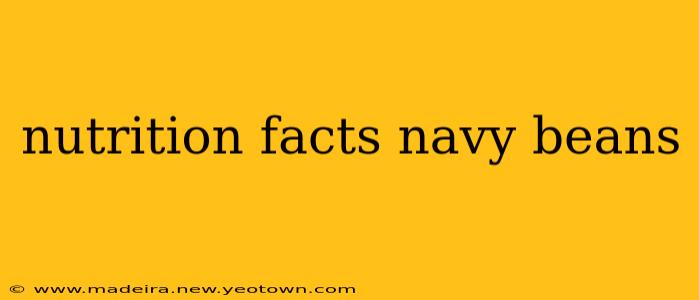Navy beans, those humble little legumes, often relegated to the background of the pantry, are actually nutritional superstars. They're packed with essential nutrients and offer a surprisingly diverse range of health benefits, making them a worthy addition to any healthy diet. Let's embark on a journey to uncover the nutritional secrets held within these unassuming beans.
What are the nutritional benefits of navy beans?
The nutritional profile of navy beans is incredibly impressive. One cup (approximately 179 grams) of cooked navy beans provides a significant amount of:
-
Protein: A powerhouse of plant-based protein, essential for building and repairing tissues, supporting a healthy immune system, and maintaining energy levels. Navy beans provide roughly 15 grams of protein per cup, making them an excellent choice for vegetarians and vegans.
-
Fiber: Boasting nearly 15 grams of fiber per cup, navy beans are a champion for digestive health. Fiber promotes regularity, helps lower cholesterol, and contributes to a feeling of fullness, aiding in weight management.
-
Iron: Essential for carrying oxygen throughout the body, iron is present in notable amounts in navy beans. While the absorption of iron from plant-based sources can be slightly lower than from animal sources, combining navy beans with vitamin C-rich foods can enhance iron uptake.
-
Folate: Crucial for cell growth and development, folate is particularly important during pregnancy. Navy beans are a good source of this vital B vitamin.
-
Potassium: An important electrolyte, potassium helps regulate blood pressure and fluid balance in the body.
-
Magnesium: Essential for numerous bodily functions, including muscle and nerve function, blood sugar control, and blood pressure regulation. Navy beans contribute a good amount of magnesium to your diet.
How many calories are in a cup of navy beans?
A single cup of cooked navy beans contains approximately 220 calories. This makes them a relatively low-calorie, high-nutrient food, perfect for those looking to maintain a healthy weight or increase their nutrient intake without excessive calorie consumption.
How much protein is in a cup of navy beans?
As mentioned earlier, a cup of cooked navy beans delivers approximately 15 grams of protein. This substantial amount of protein makes them a valuable addition to vegetarian, vegan, and omnivorous diets alike, contributing significantly to daily protein requirements.
Are navy beans good for weight loss?
The high fiber content in navy beans plays a crucial role in weight management. Fiber promotes satiety, keeping you feeling full for longer periods, reducing overall calorie intake. Additionally, the protein in navy beans helps to maintain muscle mass, an important factor in weight loss and overall health.
Are navy beans good for diabetics?
Navy beans have a relatively low glycemic index (GI), meaning they cause a slower and more gradual rise in blood sugar levels compared to high-GI foods. The high fiber content also helps regulate blood sugar levels. However, as with any dietary changes, individuals with diabetes should consult their healthcare provider or a registered dietitian before making significant dietary adjustments.
What are the health benefits of navy beans?
Beyond the specific nutrients, the overall health benefits of incorporating navy beans into your diet are numerous. They contribute to improved digestion, better blood sugar control, reduced cholesterol levels, and may even play a role in reducing the risk of certain chronic diseases. Their versatility in recipes also makes them a convenient and enjoyable addition to any meal plan.
Conclusion:
The next time you reach for a can of navy beans or find yourself at the grocery store, remember the nutritional powerhouse they represent. From their high protein and fiber content to their abundance of essential vitamins and minerals, navy beans are a humble yet mighty contributor to a healthy and balanced diet. Their versatility in culinary applications only adds to their appeal, making them a delicious and nutritious addition to any kitchen.

